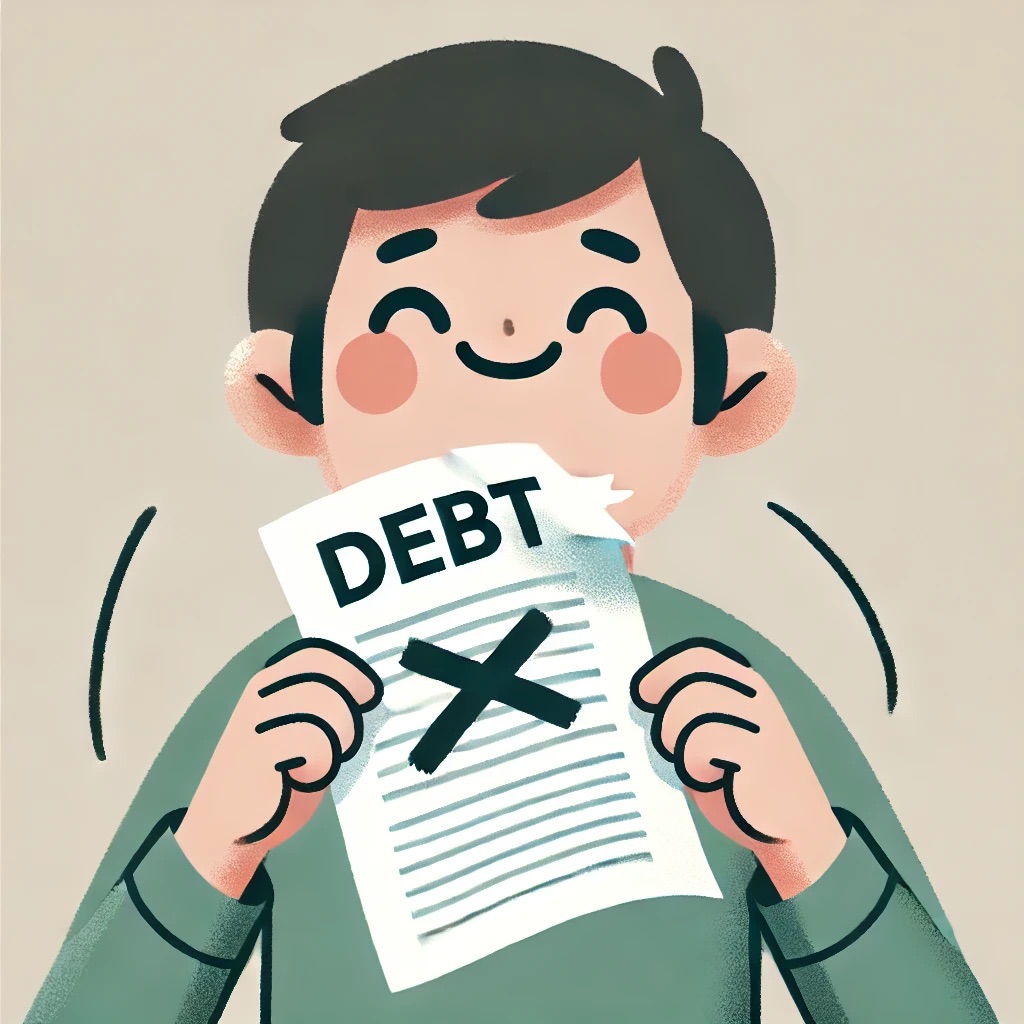Key takeaways
- Bankruptcy can discharge most unsecured debts but does not eliminate all financial obligations like certain taxes, child support, and alimony.
- Filing for bankruptcy initiates an automatic stay, stopping most creditor harassment and collection activities immediately.
- What you cannot do after filing bankruptcies includes ignoring non-dischargeable debts and securing new credit lines immediately.
Which debts can be discharged in bankruptcy is important to understand before you decide to take that step. Bankruptcy is a complex legal proceeding. While its goal is to eliminate as many outstanding debts as possible, giving you a fresh start, not all debts are eligible.
This article delves into what happens if you file bankruptcy, what types of debt are covered, and which ones you will still have to pay. Knowing the limitations of debt relief through bankruptcy will help you make informed decisions and plan your next steps effectively.
Jump to:
- What is a discharge in bankruptcy?
- What debts can be discharged in bankruptcy?
- What debts are not discharged in bankruptcy?
- Should you file for bankruptcy if you can’t discharge all of your debt?
- What is the downside of filing for bankruptcy?
- Does the debtor have the right to a discharge or can creditors object to the discharge?
- Can a debtor receive a second discharge in a later Chapter 7 case?
- What can the debtor do if a creditor attempts to collect a discharged debt after the case is concluded?
- May the debtor pay a discharged debt after the bankruptcy case has been concluded?
- Bottom line
What is a discharge in bankruptcy?
What happens if you declare bankruptcy is that a court decides which debts you must pay and which ones will be discharged. A bankruptcy discharge is a court order that releases a debtor from personal liability for certain sums owed. It means you are no longer legally required to repay the debt. This is a crucial component of what bankruptcies do; they offer people a fresh financial start.
When you receive a discharge, creditors can no longer pursue payment.
What debts can be discharged in bankruptcy?
Discharged debts are typically unsecured, meaning they are not backed by collateral. Unsecured debt includes:
- Credit card debt
- Medical bills
- Personal loans
- Utility bills
- Some student loans
- Most tax debts
When you file for bankruptcy, these debts can be wiped out, freeing you from the obligation to repay them.

In Chapter 7, most unsecured debts will be discharged entirely right away. What happens to debt when you file Chapter 13 bankruptcy is slightly different. In Chapter 13 bankruptcy, you enter into a repayment plan lasting three to five years, where you repay a portion of everything you owe. Once you’ve completed the repayment plan, any remaining debts will be discharged.
Bankruptcy does not discharge student loans, including federal student loans, except under limited circumstances. To qualify for such a discharge, you will have to prove in an adversary proceeding that paying the loan causes undue hardship – that you cannot pay the loan and maintain a minimal standard of living. In November of 2022, the United States Department of Justice implemented new guidelines, making it easier to prove undue hardship.
You may be able to discharge certain federal, state, or local taxes if they are from several years back. Income tax debt cannot be discharged without a special exemption, but you may be able to arrange a payment plan or installment agreement with the IRS. If the issue is income tax, talk to a tax attorney before filing.
Considering filing for bankruptcy?
What debts are not discharged in bankruptcy?
Does bankruptcy clear all debt? No, it does not. Certain types of debt cannot be discharged and must still be paid. The specifics vary depending on if you file Chapter 7 or Chapter 13 bankruptcy. In general, nondischargeable debts include:
- Secured debt
- Most student loans
- Certain tax debt
- Child support
- Spousal support
- Debts resulting from fraud
- Debts from willful and malicious injury
- Court fines or penalties
- Criminal restitution
- Debts not discharged in a prior bankruptcy
- Debts you forgot to list in your bankruptcy petition (unless the creditor learns of your bankruptcy case)
- Debts from personal injury caused by the debtor’s operation of a motor vehicle while intoxicated
Bankruptcy takes care of unsecured debt like credit card debt. If you have secured debt like car loans or a mortgage, you will have to continue paying or risk losing the collateral. There are exceptions, and it matters if you file for Chapter 13 or Chapter 7. Chapter 7 may require liquidation of certain assets, while Chapter 13 allows for a repayment plan to keep your property. It’s essential to discuss your case with an attorney before filing to fully understand what is covered and the implications for your specific situation.
Bankruptcy does not discharge certain obligations. You are still obliged to pay fines imposed by court judgments or owed to the federal government.
If you have federal student loans, while they are generally non-dischargeable, you may be eligible for alternative debt relief options such as loan forgiveness, an income-based repayment plan, or temporarily deferred or reduced payments due to financial difficulties.
Knowing bankruptcy’s limitations can help you better prepare for the process and manage your financial future more effectively.
Should you file for bankruptcy if you can’t discharge all of your debt?
Bankruptcy filing can still be a viable option, even if you cannot discharge everything you owe. While certain obligations like student loans and child support will remain, eliminating credit card debt, personal loans, and medical bills can significantly reduce your overall debt burden. This reduction can mean that you now have enough income to better manage your remaining payments and give you breathing room. It’s important to evaluate your financial situation and what type of debt you have. Consult with a financial advisor or bankruptcy attorney to determine if this step is right for you.
Bankruptcy can stop creditor harassment and collection activities
Bankruptcy can also provide immediate relief from creditor harassment and collection activities. Once you file, an automatic stay goes into effect. This stay prevents creditors and debt collectors from contacting you, initiating a lawsuit, or implementing wage garnishments. This legal protection can give you the necessary breathing room to reorganize your finances.
Go to MoneyFor to learn even more!
What is the downside of filing for bankruptcy?
The bankruptcy process is not to be taken lightly. Yes, it can provide significant relief, but it also comes with notable downsides.
One major disadvantage is the long-term negative impact on your credit score. Chapter 7 bankruptcy remains on your credit report for up to 10 years, and Chapter 13 for up to 7 years. This negative mark will make it difficult to borrow money in the near future. When you are finally able to secure new credit, the loans and credit cards you’re offered will come with less favorable terms, including higher interest rates.
Another downside is the potential loss of property. In Chapter 7, your non-essential assets will be sold to repay dues. Chapter 13 bankruptcy protects assets, but you must adhere to a strict court-approved payment plan for three to five years.
Moreover, what you cannot do after filing for bankruptcy includes obtaining new lines of credit immediately and making large purchases without court approval if you’re in a Chapter 13 repayment plan.
Does the debtor have the right to a discharge or can creditors object to the discharge?
Debtors generally have the right to a discharge, but creditors can object under certain circumstances. The creditor or the bankruptcy trustee may file an objection if they believe the debtor has engaged in fraudulent activity, such as hiding assets or providing false information. If the bankruptcy court finds merit in these objections, it may deny the discharge for the specific debt or the entire bankruptcy case. Therefore, it is crucial to provide accurate and complete information throughout to avoid objections and ensure a smoother path to debt relief.
Can a debtor receive a second discharge in a later Chapter 7 case?
A debtor can receive a second discharge in a later Chapter 7 case, but certain time restrictions apply. Specifically, a debtor must wait eight years from the filing date of the previous Chapter 7 to be eligible for another discharge. This waiting period is designed to prevent abuse of the system. Repeated filings within a short period can lead to dismissal and loss of discharge eligibility.
Interested in debt management?
What can the debtor do if a creditor attempts to collect a discharged debt after the case is concluded?
If a creditor attempts to collect a discharged debt after the case is concluded, the debtor can file a motion with the court to report the violation. The court may impose sanctions on the creditor for ignoring the discharge order. Documenting all communications from the creditor and consulting with an attorney can help ensure the debtor’s rights are protected and appropriate actions are taken to stop the harassment.
May the debtor pay a discharged debt after the bankruptcy case has been concluded?
Yes, a debtor may voluntarily pay a discharged debt. Some debtors choose to repay in order to maintain relationships with specific creditors or out of a sense of moral obligation. These payments are entirely voluntary and cannot be enforced by the creditor.
Want to be done with debt?
Frequently asked questions
1. Which of the following can not be discharged by filing bankruptcy?
The following debts cannot be discharged: student loans, most tax obligations, child support, alimony, and debts incurred through fraud or malicious actions. Additionally, court fines and penalties, as well as personal injury debts from driving under the influence (DUI), remain the debtor’s responsibility.
2. How can the debtor obtain another copy of the discharge order?
To obtain another copy of the discharge order, the debtor can contact the bankruptcy court where the case was filed. Most courts offer copies for a small fee. Alternatively, the debtor can request a copy from their bankruptcy attorney or access it through the court’s online system, PACER (Public Access to Court Electronic Records), if available.
Bottom line
Bankruptcy can help eradicate unmanageable debt, but it is not without its limitations. Neither Chapter 7 nor Chapter 13 forgives all that you owe; your credit score will take a big hit, and you will not be able to secure new lines of credit any time soon.
Despite these issues, bankruptcy remains a powerful debt relief tool. It can release you from any obligation to pay any outstanding debts, giving you a fresh financial start.
Before you choose to go this route, it’s important to fully understand the process, the types of debts involved, and the long-term implications. Talk to an attorney or credit counselor. They can help you make the best decision for your financial future and navigate the path to recovery more effectively.


